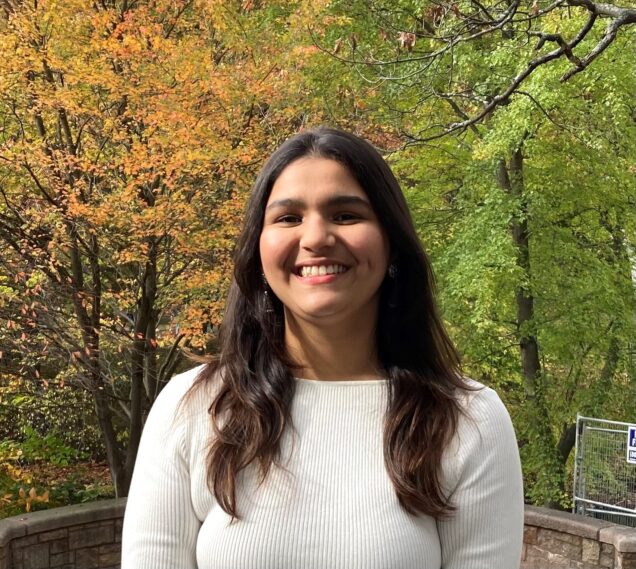
Originally from Mumbai, India, Soumya Sathe (CAS’24) came to Boston University to study biology. Now, she is pioneering new research in the field of eating disorder symptomatology and running large-scale projects while in college.
On campus, Sathe has served as a peer mentor for FY101, a one-credit course to introduce first-year students to BU and college life, and she is the music director for Suno, BU’s South Asian A Cappella group.
After successfully defending her honors thesis, she will graduate with honors from the Department of Psychological & Brain Sciences. Sathe plans to seek a position as a clinical research coordinator or research technician, and after gaining some professional experience, she plans to go to graduate school to study clinical psychology or neuroscience. Ultimately in her career, she sees herself returning to the classroom as a professor.
Arts & Sciences spoke with Sathe, who is majoring in biology and psychology.
Interview responses have been edited for clarity.
Arts & Sciences: Why did you choose your majors?
Sathe: I always knew I wanted to do something involving biology. Then, I took Psychology 101 as one of my freshman first-semester classes and I loved it so much I realized I wanted to declare psychology as my second major. I think I am drawn to psychology and neurobiology because one of my biggest strengths is my ability to empathize with people and I’ve related to that throughout high school, now I feel like I can channel that into something meaningful.
What topics are you particularly interested in?
As of the moment, I am most interested in eating disorders, OCD, and other anxiety disorders. My interests are still quite broad, but most of my research has been on eating disorders.
Can you talk about your research?
I realized that there were some gaps in the literature around eating disorders. I eventually ended up doing a UROP project, looking at 20 years worth of data from the Center for Anxiety and Related Disorders. I looked at personality and emotional regulation factors that might differentially predict what sort of eating disorder behavior somebody might exhibit. There’s a lot of literature on eating disorder predictors in general, but not enough on what differentiates patients with a particular kind of symptomatology versus another kind.
Can you describe your experience as an FY 101 peer mentor?
That was amazing for me! That was in the fall of 2021, COVID was still very much a thing. I really needed social interaction and being a peer mentor for FY 101 could give that to me. I was able to understand what students might want or need from an instructor and I really felt like I connected with my students. I still occasionally talk to some of them, it was just the best time. It piqued my interest in mentoring or tutoring, I maintain that eventually, I would like to be a professor.
Can you talk about being part of BU Suno?
Suno has been absolutely crucial to my college experience, since the first semester of my first year. I joined it while I was still in India, so I was remote. It has been a source of so much stability, a very solid social circle, and a way for me to keep singing. Suno has given me a lot of leadership opportunities. I’ve been the music director for two years now. I’ve not only come into my own of arranging music and allowing my creativity to flow, but also being able to direct a team and teach arrangements. It’s a rewarding and sometimes challenging experience, but it’s taught me a lot about leadership.
Hear more from Sathe about her BU experience in a new Senior Spotlight video.
Interview by Shelby Rose Long (COM’27)